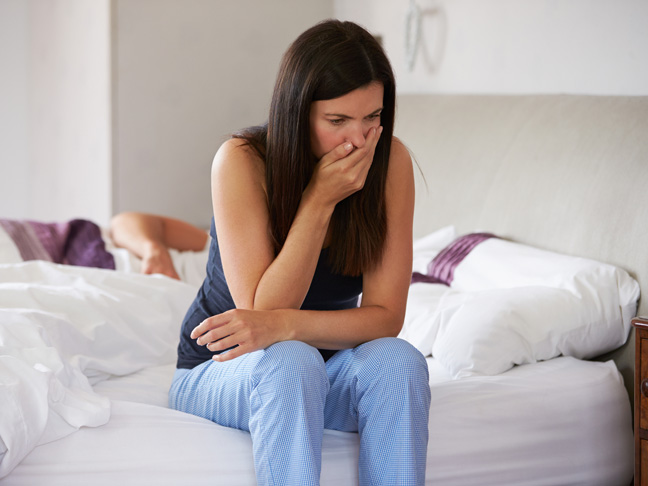Pregnancy can be a magical, beautiful time — unless you’ve got morning sickness, and then it’s an unbearable nightmare. No matter how excited you are about that BFP, chances are, you’ll be slapped with at least a couple months of nausea…or longer. “I had morning sickness for my entire pregnancy,” says Ashley C., a mom of two from Brooklyn, NY. “Eating anything seemed impossible. It was like having the worst hangover of your life for nine months straight.” And, despite it’s name, morning sickness can happen at any time of day or night, points out Alan Adler, MD, a physician at OBGYN of Mount Sinai. If you are one of the 90 percent of pregnant women affected by it, we’ve got all the info you need, plus tips on how to fight it.
According to Dr. Adler, morning sickness starts around 6 weeks of pregnancy, the time when hCG hormone levels are beginning to increase. Often the first sign of pregnancy, morning sickness is identified by sudden (and often lingering) feelings of nausea, sometimes (but not necessarily) followed by vomiting. A bout of morning sickness can last minutes or hours, and can hit any time of day or night.
What causes morning sickness?
As common as it is, there is no definitive answer as to why morning sickness occurs. “Some feel it could be psychological, or hormonal,” says Dr. Adler. When testing hormone levels in the first trimester, women with a higher hCG level often experience more nausea, though not always. Severe morning sickness in prior pregnancies may also make you more likely to get it again, and if your mother had morning sickness, you may be more likely to get it, too. Some 2 percent of pregnant women will experience an extreme form of morning sickness called Hyperemesis gravidarum, which can often be debilitating and may require hospitalization for dehydration. Gastroparesis (when weak stomach muscles delay the emptying of food) as well as H. Pylori (a bacterium found in the stomach) may also make morning sickness more prevalent, suggests Dr. Adler.
Who is most likely to get morning sickness?
Morning sickness doesn’t discriminate, and most pregnant women are likely to experience some form of nausea (though not all will vomit). Dr. Adler adds that morning sickness is often more common in twins, because hormone levels are higher. Those who don’t experience morning sickness might have a lower hCG level, or simply have a higher tolerance for that roller coaster feeling.
What you can do about it?
“We suggest people take folic acid prior to getting pregnant,” says Dr. Adler. In addition to decreasing the risk of birth defects (such as spinal bifida and brain defects) prenatal vitamins also help prevent morning sickness. “Vitamin B6 is thought to help,” adds Dr. Adler, perhaps because it is known to help our bodies process amino acids. Those are good preventative measures, but if you’ve already been hit with morning sickness, here are a few tips:
1. Avoid making it worse. Dr. Adler recommends avoiding triggers like specific foods, smells, hot rooms, or confined spaces that might make you feel sick.
2. Try alternate therapies. Some women find acupressure points (try sea-sickness wristbands) or hypnosis to be helpful in combatting morning sickness.
3. Eat small meals. “Instead of three meals a day, eat little bits throughout the day,” suggests Dr. Adler. That way, you’re never full but never empty.
4. Stay sitting up after meals. Lying down after eating a meal can slow the digestive process and perhaps increase the feeling of nausea.
5. Eat easily digestible foods. Decrease the chances of nausea by eating foods like yogurt, lean protein, and whole grains.
6. Take ginger. Some women find that ginger soothes an upset stomach. Try ginger chews, pills, ginger ale, or even flat coke.
7. Keep crackers by the bed. Nibbling a cracker or two when you first wake up – before getting out of bed – could help your stomach from feeling so empty in the morning
8. Eat carbs. “More people tolerate carbs better,” suggests Dr. Adler. “We want people to have a balanced diet, but some women can only handle carbs (when nauseous).” And don’t worry about weight gain. Dr. Adler adds that it is more important to find something you can eat to get through it. “When the morning sickness ends, we tell them to watch the carbs and eat more nutritiously.”
9. Stay hydrated. In the case of hyperemesis, a trip to urgent care for fluids might help.
10. Take medication, if your doctor recommends it. If women are so ill they’re unable to stay hydrated, they need medication, and Dr. Adler recommends Diclegis. “B6 works, but if they are nauseous and vomiting then it’s not enough,” he says. “Diclegis has an antihistamine that helps women sleep at night.” Additionally, it’s FDA approved and safe for pregnant women.
When does morning sickness typically end?
According to Dr. Adler, morning sickness is usually done at 12 weeks, at which point hCG levels have begun to decline. “But we’ve had many patients that it continues into the third trimester,” he adds.
So, ultimately every case is different. With any luck, your morning sickness will be short lived, but grab some crackers and a ginger chew and rest assured that the nausea will not affect your baby.
More for Pregnant Moms:
- What Is the Morning Sickness Gender Theory?
- What Foods Are Really Off-Limits During Pregnancy?
- Discharge During Pregnancy: What’s Normal & What’s Not?
Photo: Getty
